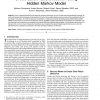Free Online Productivity Tools
i2Speak
i2Symbol
i2OCR
iTex2Img
iWeb2Print
iWeb2Shot
i2Type
iPdf2Split
iPdf2Merge
i2Bopomofo
i2Arabic
i2Style
i2Image
i2PDF
iLatex2Rtf
Sci2ools
TDSC
2008
2008
Credit Card Fraud Detection Using Hidden Markov Model
Due to a rapid advancement in the electronic commerce technology, the use of credit cards has dramatically increased. As credit card becomes the most popular mode of payment for both online as well as regular purchase, cases of fraud associated with it are also rising. In this paper, we model the sequence of operations in credit card transaction processing using a Hidden Markov Model (HMM) and show how it can be used for the detection of frauds. An HMM is initially trained with the normal behavior of a cardholder. If an incoming credit card transaction is not accepted by the trained HMM with sufficiently high probability, it is considered to be fraudulent. At the same time, we try to ensure that genuine transactions are not rejected. We present detailed experimental results to show the effectiveness of our approach and compare it with other techniques available in the literature.
| Added | 15 Dec 2010 |
| Updated | 15 Dec 2010 |
| Type | Journal |
| Year | 2008 |
| Where | TDSC |
| Authors | Abhinav Srivastava, Amlan Kundu, Shamik Sural, Arun K. Majumdar |
Comments (0)

